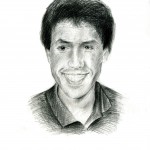As the spring semester begins with terrifying swiftness, we should pause to consider President Peter Salovey’s first term on the job. All in all, I think most would agree that it’s been a successful couple of months. The transition went off without a hitch, we’re $250 million richer, and we all got to enjoy the inaugural festivities. Yet President Salovey is lacking in one vital and easily fixed way: He could be more approachable.
 Let me start with a story. For most of the 1960s and 1970s, Yale’s president was Kingman Brewster. Brewster saw the University through the student protests and complex racial politics of that era, publicly sympathizing with and legitimizing anti-war and civil rights activists. He made Yale accessible to women, minorities and the working class, and he made himself more accessible to them. Though he was not perfect, Brewster was unceasingly approachable.
Let me start with a story. For most of the 1960s and 1970s, Yale’s president was Kingman Brewster. Brewster saw the University through the student protests and complex racial politics of that era, publicly sympathizing with and legitimizing anti-war and civil rights activists. He made Yale accessible to women, minorities and the working class, and he made himself more accessible to them. Though he was not perfect, Brewster was unceasingly approachable.
Brewster walked around. By scheduling meetings all across campus, rather than solely in his office, he made himself visible. Intentionally taking different routes each time and walking — never driving — he would often stop to talk to students as he crossed various courtyards and streets. Brewster and his wife, Mary Louise, were regularly seen walking their Labradors around campus in the evenings. When students inevitably invited the first couple up into their rooms, they would gladly oblige.
At every sports event, concert and holiday function, the Brewsters made themselves accessible. When the freshmen moved in on Old Campus, Brewster and other high-level administrators were there to greet them, helping to lug bags up stairs and into dorm rooms. Students knew this man who walked around, who paused briefly to talk with them and who even stopped by their rooms.
Brewster’s focus on approachability did not just extend to himself and other administrators. He also mandated that members of the Yale Corporation eat lunch with undergraduates and graduate students every time they were in town — which they were, frequently.
Fast forward to the years of President Richard Levin. President Levin, for all of his work engaging with the city of New Haven and with the wider world, was not approachable to students. President Levin, who so skillfully grew Yale’s endowment and built its brand, was not known as one to eat with students, to chat with them, to meander. He did not walk across campus to meetings very often.
President Salovey is trying to make himself more approachable than his predecessor. His “Notes from Woodbridge Hall” are warmer, funnier and more informative than were Levin’s communiqués. He has attempted to make himself visible, conducting the band at a hockey game and performing with his bluegrass band at the Inaugural Ball.
These actions are a wonderful start, a good sign of what the future could hold. But they are not all he is capable of doing.
What I want from Salovey is simple. It’s easy. Please, sir, take a walk. Walk across campus to meetings; go for a stroll in the evenings. Chat with students, stop by rooms, converse with spectators at sports games or official ceremonies.
I understand that the presidency is a time-consuming job, and I applaud President Salovey for the work he’s doing and for the efforts he’s made thus far to be visible. But visibility is not enough. Approachability is key.
By taking valuable time to walk around, to talk with students, President Salovey can ensure that he keeps himself apprised of student opinion. President Brewster knew this. He was able to weather the storms of the 1960s and 1970s because he knew what students were feeling and he knew he had to respond.
Many have greeted with skepticism or scorn the idea that simple approachability can change an administration. But approachability doesn’t just mean friendly faces — it means administrators who better understand the student attitude toward changing circumstances, what they are feeling and why. Would the administration have attempted to ram through last year’s grading changes if they better understood Yale’s culture? Would Dean Mary Miller have trampled on free speech had she anticipated the firestorm that would follow the CourseTable decision? Maybe, but maybe not.
Students also bear some of the responsibility in ensuring that our leaders understand our concerns. If we see President Salovey on the street, we should go up to him and tell him what we think. But first, he has to go outside and take a walk.
Scott Stern is a junior in Branford College. His column runs on Wednesdays. Contact him at scott.stern@yale.edu.







